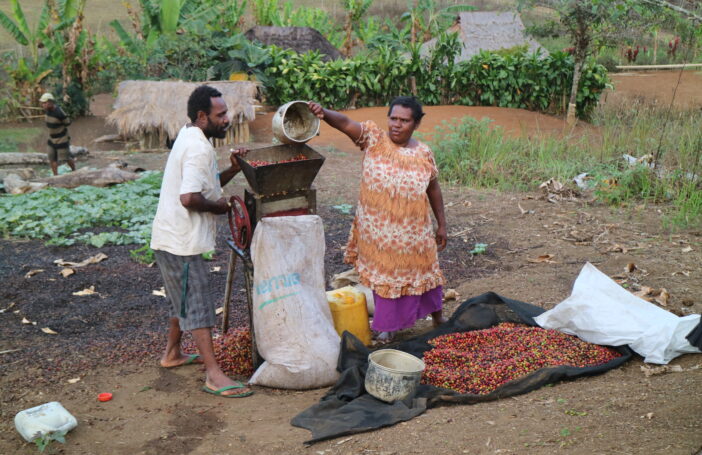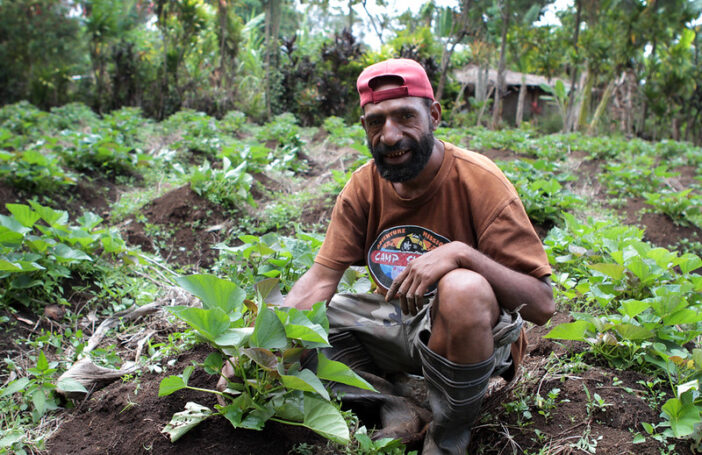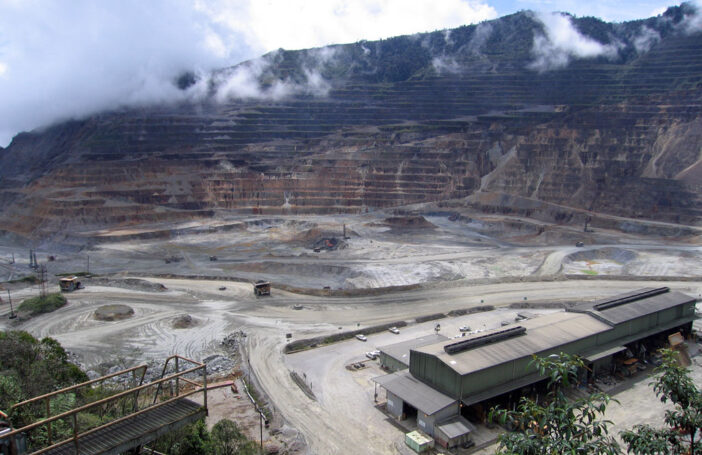PNG’s general elections, conducted at 5-year intervals, tend to coincide with a decline in exports of coffee, an important cash crop. For example, PNG exported 20,000 tonnes of coffee last year, 5,000 tonnes less than the previous year. To put this decline into perspective, a reduction of 5,000 tonnes in coffee exports is equivalent to rendering nearly 43,750 acres of coffee farmlands unproductive in a single year.
Historical data on coffee production isn’t available, but coffee export volumes may be used to assess coffee production over time. During seven of PNG’s last ten election years, coffee exports fell (Figure 1). Simple linear regression results show a negative relationship between growth in coffee exports and election years since independence, with significance at the 12% level. And as Figure 1 shows, election years aren’t the only ones in which coffee growth is negative.

There are two reasons why coffee production is likely to be negatively affected by elections. First, the months leading up to the vote are festive, drawing people away from their daily activities of subsistence and cash cropping to participate in campaigns, dances and feasts. The absence of smallholder farmers, who contribute over 85% of coffee production, directly impacts coffee growing. A second reason is that election-related conflict, which is common, hinders farmers from returning to their coffee farms. This is particularly true of the Highlands, the region where more than 90% of PNG’s coffee is grown, and where elections are most violent. The Highland’s elections last year were particularly bad, disrupting the livelihoods of an estimated 265,000 people, according to the UN.
Elections are only one of a number of problems that the coffee industry is facing. In 2022 coffee exports reached an all-time low (Figure 2). On average, PNG exported 55,000 tonnes of coffee annually between 1977 and 2022. The highest export volume recorded was 85,000 tonnes in 1989. However, coffee exports have fallen since, and the 20,000 tonnes exported last year was a record low.

Overall, coffee prices have not kept up with inflation since independence. However, coffee prices in nominal terms have been increasing since 2013, doubling in some instances. But rising prices in recent years have not arrested the decline in coffee exports, indicating that other factors, likely domestic, are affecting coffee supply.
One supply side constraint involves ageing coffee plants. Most coffee plants in PNG have exceeded their economic productive age range, which is 8–20 years. Many coffee farms were planted in the 1960s and began harvesting in the 1970s. A hectare of land that produced 1,000 kg of green bean coffee then, produced around 400 kg of green bean coffee by 2013. In addition, World Bank analysis found that coffee farmers were only harvesting 84% of the yield obtainable with improved production practices.
The coffee berry borer (CBB) invasion has also affected coffee production. In 2017, the CBB affected the Eastern Highlands, Jiwaka and Western Highlands provinces – the three leading coffee-producing provinces in the Highlands. Over half of 510 farmers surveyed in 2021 stated that their farms were infested by CBB.
Another issue is that farmers are abandoning coffee for other cash crops. Real incomes from coffee are lower than they were in past decades. When calculating the returns to labour of 26 crops in PNG, coffee was found to have lower returns compared to many of the other crops common in the Highlands (both staples and cash crops).
Other factors have contributed to the stagnation of coffee production. These include poor road conditions, theft of berries, land grabs and security issues.
Yet coffee remains very important to PNG. Coffee contributes 6% to the nation’s GDP and is cultivated in 17 out of 22 provinces, supporting approximately 3.5 million people. The PNG government’s focus on coffee in recent years is encouraging. Support includes creating a minister for coffee, providing subsidies, and setting a price floor for parchment coffee (that is, dried beans) at K7 per kg in 2022. Financial support from the World Bank is also promising. In mid-2022, the World Bank committed K50 million from its PNG Agriculture Commercialization and Diversification Project to support coffee production in PNG.
It remains to be seen, however, if these initiatives will help repair the damage caused not only by election disruptions but by the various constraints that are pushing coffee production down.
Data are from the PNG Budget Database, the PNG Economic Database and the Bank of Papua New Guinea. The author’s workings are available in this Excel spreadsheet.





Insightful research into coffee and election impact is important as it is a livelihood sustainer. It would be good to see relation with cocoa and election as cocoa is main income generation option for cocoa farmers in coastal communities and even highlands now. Both cocoa and coffee are Green and have strategic importance in government Vision 2050, MTDG 4, and Government dreams of making PNG a rich black nation and take back PNG. These small coffee green and cocoa beans have potential for transformative rural development with support from national government and donor assistance like PPAP. It was a wonderful read.
This is an interesting study. May I ask if you have any reference materials for coffee farmer populations across the provinces? It could really help to know how many people are actually affected as per the election disturbances etc.
Despite the hindrances there is still a possibility for other communities that doesn’t like violence and tribal or election related problems. Be selective when offering contracts of partnerships.
Coffee and cocoa were important non-minerals exports in the early years after independence. But as the Development Policy Centre’s PNG economic database shows, they are now been replaced by palm oil, logging and fisheries (tuna). It remains to be seen if coffee will be competitive against palm oil especially. Otherwise market will reallocate resources and labour to more productive sectors.
Thanks Michael,
From my observation in Morobe Province, coffee and cocoa are not going to catch up with palm oil in the foreseeable future.
Massive hectares of cocoa and copra plantation land owned by Markham Farming Company Limited is now being bought by NBPOL. NBPOL replaced almost all the cocoa and copra with palm oil and they are even extending their palm oil plantation. This palm oil plantation has advantage of being in peaceful part of the country during the elections and also people are being contracted and employed to work in the plantation. Though there are recent may be one off aggressions like burning of ballot papers in Morobe during election. But its far from plantation area. Palm Oil plantations also has the advantage of being close to towns and cities with good government services which could attract more labours from rural areas who are mostly coffee farmers to migrate to and work in the palm oil plantations. I head similar stories of labour shifts with palm oil plantation in Ramu Valley, Madang Province.
The conversion of huge cocoa planation into palm oil plantation between Markham Farming Company Limited and NBPOL could partly explain the nose dive experiences of cocoa exports from 26 800 tonnes in 2020 to merely 37 tonnes in 2021 as shown in the Devpol PNG economic database.
Thanks for this, Raymond, David and Kingtau… yes this a feature of the coffee and election cycle, and 2022 was expected to be a great coffee season despite the growing spread of CBB, but especially because of the high coffee price. unfortunately the main harvest season also coincides with election times every 5 years, and with progressively more disruptive elections, especially across the Highlands, with violence but also more money politics and feasts, etc, luring farmers from harvesting, the impact has become greater. It’s interesting that in the mid-2000s we raised this issue, and during the PNG Updates, that were then held in 2 provinces each year as well at NCD. Rod Duncan (son of Ron Duncan of ANU Crawford School) did some analysis that found, which he presented I think at the forum at UOG, no significant correlation between election and reduced crop or returns. I wasn’t fully convinced by his findings then, but I think the case is much clearer now … you can look up his paper in the PEB from around 2007.
Thanks for your comment, Paul.
I had a quick look at Rod’s paper and saw that though the sign of election variable is negative, its impact is not statistically significant-similar to ours. Using election festivities and election violence as Instrumental Variables could possibly help capture the impact of elections on coffee exports. But consistent time series data on specific election festivities and election violence for PNG to my novice experience is non existent.